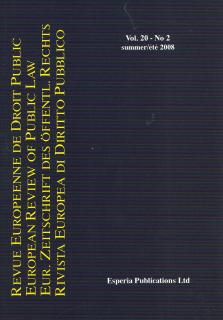
Jurisprudence
Constitutional / Constitutionnelle
2006
France
Professeurs à l’Université Panthéon-Sorbonne Paris I,
Directeurs du centre de recherche de droit constitutionnel
The year 2007 marks a clear evolution with regard to the control of constitutionality of the laws which transpose the Community directives. The limited control of the obvious incompatibility of the transposition law with the objective followed by the directive (535 DC), announced (540 DC), and then operated effectively (543 DC), remains surrounded by two conditions: the legislative transposition cannot go against “a rule or a principle inherent in the constitutional identity of France, unless the legislator agreed to it”; because of the short time given by Article 61C, the Council cannot address a preliminary question to the Court of Justice. As far as the parliamentary law is concerned, the Council tightens up the conditions of exercise of the right of amendment, in particular on the face of the constitutional objective of clarity and sincerity of the parliamentary debate: on the basis of the first reading, this right does no longer apply, in principle, to the provisions on which the two Chambers have reached an agreement (533 DC). The same severity is manifested with regard to the deviations in the exercise of the right of amendment and leads the Council to apply full-force its jurisprudence with regard to “cavaliers sociaux” in the decision 544 DC. Finally, the Council improves its jurisprudence concerning the property right: on the one hand, the scope of this right becomes extended and covers from now on the intellectual property (540 DC et 541 DC); on the other hand, the conditions for the privatisation of public enterprises are refined, the legislator being explicitly in charge of abolishing the characteristics of public service, in particular as far as the monopoly in the provision of services (543 DC) is concerned.
L’année 2007 marque une nette évolution quant au contrôle de constitutionnalité des lois transposant des directives communautaires. Le contrôle restreint d’incompatibilité manifeste de la loi de transposition avec l’objectif poursuivi par la directive (535 DC), annoncé (540 DC), ensuite effectivement opéré (543 DC), reste entouré de deux conditions: la transposition législative ne peut aller à l’encontre d’“une règle ou un principe inhérent à l’identité constitutionnelle de la France, sauf à ce que le constituant y ait consenti”; en raison du délai court qui lui est imparti par l’article 61C, le Conseil ne peut adresser une question préjudicielle à la Cour de justice. S’agissant du droit parlementaire, le Conseil resserre les conditions d’exercice du droit d’amendement, au vu notamment de l’objectif constitutionnel de clarté et de sincérité du débat parlementaire: à partir de la première lecture, ce droit ne vaut en principe plus pour les dispositions sur lesquelles les deux Chambres se sont mises d’accord (533 DC). La même sévérité est manifestée à l’égard des dérives dans l’exercice du droit d’amendement et conduit le Conseil à appliquer de plein fouet sa jurisprudence en matière des “cavaliers sociaux” dans la décision 544 DC. Enfin, le Conseil approfondit sa jurisprudence relative au droit de propriété: d’une part, le champ d’application de ce droit connaît une extension et couvre désormais la propriété intellectuelle (540 DC et 541 DC); d’autre part, les conditions de privatisation des entreprises publiques sont affinées, le législateur étant explicitement chargé de supprimer les caractéristiques de service public, notamment en ce qui concerne le monopole dans la fourniture des services (543 DC).





















